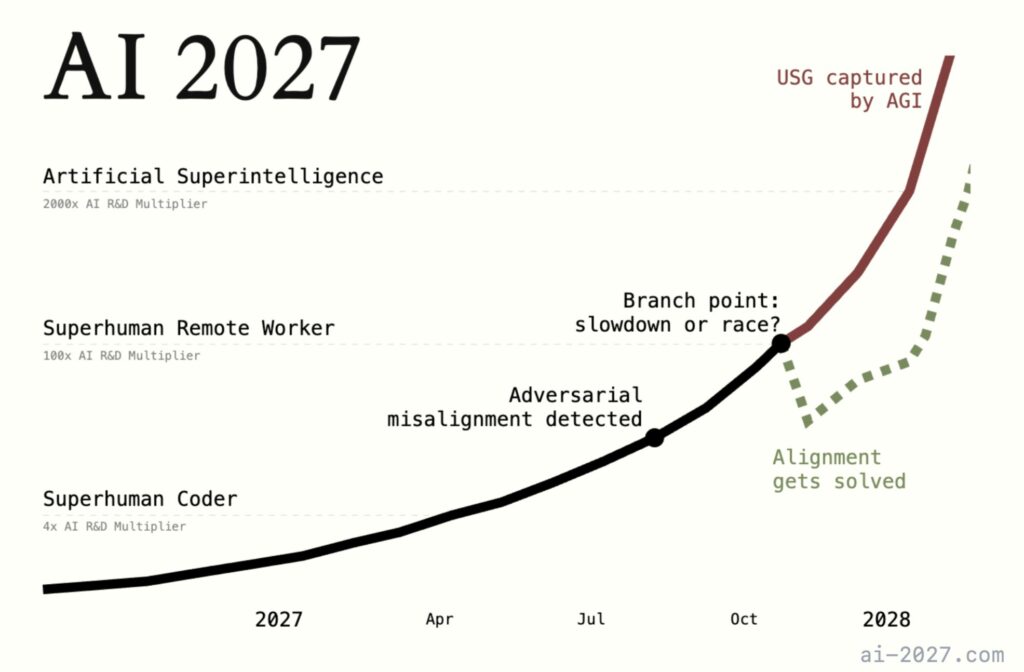All that glitters is not gold. Social media platforms, including X, are flooded with posts proposing that artificial intelligence (AI) could take over the world by 2027. These posts suggest that Artificial Super Intelligence (ASI) will be achieved by then.
I am neither an expert on AI, nor do I work in this field. However, I can confidently say that no ASI, as described by these proponents, will be created by 2027. In fact, I find it quite ridiculous to see people eagerly anticipating the prospect of artificial superintelligence (ASI) when they do not even know what it would be or what it should be like.

It’s like expecting a machine with god-like intelligence to serve us. This is simply wishful thinking. Today, it’s ASI; in 2027-28, they’ll predict things like artificial mega-intelligence (AMI) by 2032 and artificial omniscient intelligence (AOI) by 2035.
Why do I disagree, and what is my basis? We are living in an era of Large Language Models (LLMs) that are good at predicting and generating text based on user prompts. It is true that LLMs have become increasingly adept at understanding user intent and prompts. Additionally, increased computing power allows for more tokens per prompt, enabling LLMs to generate impressive amounts of text-based information. However, AI does not know everything. It is merely a tool or platform that helps users articulate their ideas, nothing more than that.
However, people argue that LLMs can now generate images, videos, and programming code as well. And since AI/LLMs can program effectively, some believe they will eventually achieve superintelligence and take over human tasks. But there are many reasons that challenge this line of thought. I will list some of them: –
a. Programming limits: AI generating code doesn’t mean it understands context or can innovate independently.
b. Undefined ASI: There’s no clear, agreed-upon definition of what ASI entails, making such timelines purely speculative.
c. Task-Specific Tool: AI excels in narrow domains, not general, human-like intelligence.
d. No self-awareness: Current AI, including LLMs, shows no signs of consciousness or independent thought.
e. Complexity of cognition: Human intelligence involves emotions, creativity, and intuition, which are far beyond the capabilities of current AI/LLMs.
f. Economic incentives: Pushing ASI claims boosts funding but doesn’t reflect technical reality.
g. Hype-driven narratives: Social media amplifies sensationalism, not realistic timelines.
h. Human oversight required: AI still needs humans to guide, correct, and interpret its outputs.
i. Overhyped expectations: Claims of ASI mirror past unfulfilled tech predictions like flying cars by 2000.
The bottom line is that nobody knows what the future holds, and any attempts at predicting it in a fantastical manner are bound to fail, as history has shown us. When computers were initially developed, it was predicted that within 50 years, we would have flying cars, quantum teleportation, and so on. None of these predictions have come true.
Please do not fall for such traps and start daydreaming about artificial superintelligence by 2027 based on these silly posts. Progress is always incremental. Observe and study the developments in AI and LLMs, and try to leverage those developments for your benefit.
If you like my writing, please subscribe to the blog. 🙂


Hey exceptional website! Does running a blog similar
to this take a massive amount work? I’ve very little understanding of computer programming however I was hoping to start my own blog in the near future.
Anyhow, if you have any recommendations or techniques
for new blog owners please share. I understand this is off topic nevertheless I simply wanted to ask.
Thank you!
Hey, thank you for the kind words. 🙂
I am glad that my content is being liked.
Actually, it is not a massive amount of work once you have set up the blog/website. The initial effort to break the inertia is the greatest, after that it is a smooth ride. But for starters, WordPress is a great place to begin. There is blogger.com as well if you are completely new to the field. I will definitely try to write a detailed post on techniques for new blog owners in the future.